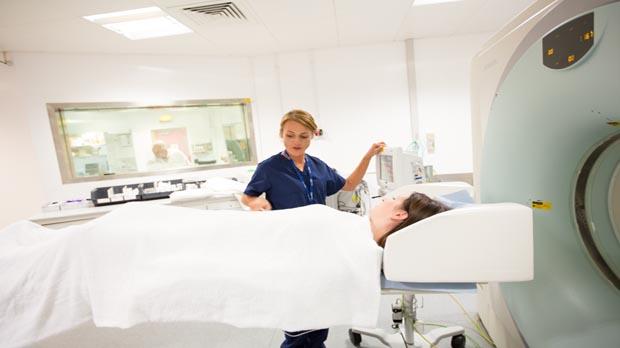
Around 1 in 5 people diagnosed with cancer in the UK take part in a clinical trial.
Please note - this trial is no longer recruiting patients. We hope to add results when they are available.
This trial is looking at a combination of dasatinib and a new drug called BMS-833923 (also known as XL139) for Philadelphia positive leukaemia.
Most people with chronic myeloid leukaemia (CML), and some people with other types of leukaemia have an abnormal  called the Philadelphia chromosome. You may hear this called Philadelphia positive leukaemia.
called the Philadelphia chromosome. You may hear this called Philadelphia positive leukaemia.
Doctors can treat Philadelphia positive leukaemia with drugs called tyrosine kinase inhibitors (TKIs). Imatinib, dasatinib and nilotinib are TKIs that doctors may use. These drugs can work well. But sometimes the doctors can still see signs of the leukaemia or the Philadelphia chromosome in your blood or  . And sometimes, even though leukaemia may respond well, the drugs then stop working (the leukaemia becomes
. And sometimes, even though leukaemia may respond well, the drugs then stop working (the leukaemia becomes  to them).
to them).
In this trial, researchers are looking at a new drug called BMS-833923. It is a type of biological therapy that can block chemical signalling between cells, which may affect their growth. The people taking part have already had imatinib, dasatinib or nilotinib, but their leukaemia has become resistant, or they still have signs of the leukaemia or the Philadelphia chromosome in their blood or bone marrow. They will have a combination of dasatinib and BMS-833923. The aims of the trial are to
You may be able to enter this trial if you

You cannot enter this trial if you
 )
) ) or around your lungs (
) or around your lungs ( )
) that would make it difficult for you to swallow or absorb tablets
that would make it difficult for you to swallow or absorb tablets in the last 6 months
in the last 6 monthsThe trial will recruit about 40 people. Everybody taking part will have dasatinib and BMS-833923. The first few patients taking part will have a low dose of BMS-833923. If they don’t have any serious side effects, the next patients will have a higher dose. And so on, until they find the best dose to give. This is called a dose escalation study. The dose of dasatinib you have will depend on the type of leukaemia you have and the phase your leukaemia is in. You take both drugs by mouth.
You take dasatinib capsules once a day. After 4 weeks, you start taking BMS-833923 tablets as well. You take them twice a day for the first week, then once a day after that. Depending on the dose you have, you may take them just once a day from when you start.
As long as you don’t have bad side effects, you can then carry on taking dasatinib and BMS-833923 for as long as this treatment helps you.
During the trial, doctors will test your blood to look for abnormal genes called BCR-ABL, which are created by the Philadelphia chromosome. If they cannot see any signs of these abnormal genes, they say you are in complete molecular remission. If you stay in complete remission for more than a year, you stop taking the drugs. But the trial team will continue to monitor you very closely for up to 2 years. If they see any signs that the leukaemia has come back, you can start taking the study drugs again.
You will see the trial doctors and have some tests before you start treatment. The tests include
 )
) )
)Depending on the dose of BMS-833923 you are having, the trial team may ask you to have a skin  . This is optional. If you don't want to have this biopsy, you don't have to. You can still take part in the trial.
. This is optional. If you don't want to have this biopsy, you don't have to. You can still take part in the trial.
During treatment, you have regular blood tests. On the first day of treatment and on 2 other days during treatment, you have a number of blood tests throughout the day and need to stay at the hospital for at least 8 hours.
You have 3 more chest X-rays, heart scans and ECGs during the first year of treatment. You also have a bone marrow test every 3 months, but this may become less frequent after a year of treatment.
When you finish the treatment, you see the trial doctors and have more blood tests. You will have a bone marrow test if you haven’t had one in the last 3 months. You then see the doctors again 2 months later.
As BMS-833923 is a new drug, there may be side effects we don’t know about yet. The possible side effects include
The trial team will talk to you about other possible side effects before you agree to join the trial.
The most common side effects of dasatinib include
We have more information about dasatinib in our Cancer drugs section.
You must not eat grapefruit or Seville oranges (or drink their juices) during the trial because they can interact with the trial drugs. And you cannot take some medicines for indigestion (antacids) at the same time as dasatinib – the trial team can advise you about this.
Please note: In order to join a trial you will need to discuss it with your doctor, unless otherwise specified.
Dr Mhairi Copland
Bristol-Myers Squibb
Experimental Cancer Medicine Centre (ECMC)
If you have questions about the trial please contact our cancer information nurses
Freephone 0808 800 4040

Around 1 in 5 people diagnosed with cancer in the UK take part in a clinical trial.